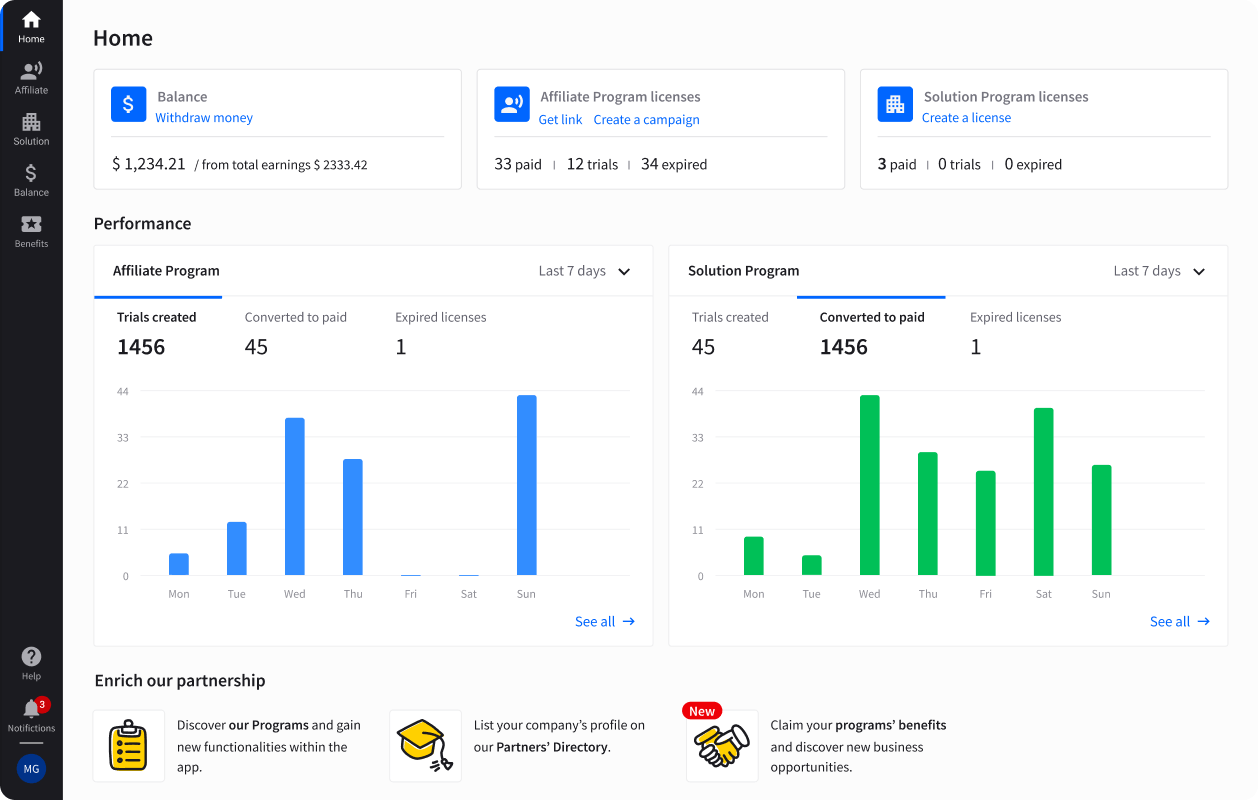Showing top 0 results 0 results found
Showing top 0 results 0 results found

Thinking about becoming a freelance PPC consultant? Smart move! With 65% of small to mid-sized businesses running PPC campaigns and 64% of B2B marketers using paid ads, there’s no shortage of clients who need your expertise.
And here’s the kicker: global search ad spending is expected to hit $351.5 billion in 2025. So, if you’ve got the skills and the drive to break free from the traditional 9-to-5 grind, a career as a PPC consultant could be your ticket to financial freedom and creative independence.
Let's dive into how you can seize these opportunities, build your expertise, and transform your PPC skills into a thriving freelance business!
What does a freelance PPC consultant do?
Freelance PPC consultants help businesses get the most out of their ad spend. They run paid ad campaigns, optimize them for better performance, and ensure clients see a solid return on investment (ROI). A consultant makes it happen if a business wants more traffic, leads, or sales.
Here’s a closer look at what you’d do as a freelance PPC expert.
1. Manage and optimize PPC campaigns
Your main job? Running paid ads on platforms like Google Adwords, Facebook Ads, LinkedIn, and Bing Ads. But it’s not just about launching ads. It’s constant optimization.
You’ll adjust bids, tweak targeting, and refine ad copy to boost performance. Clients rely on you to lower costs while maximizing conversions.
2. Conduct extensive keyword research and competitor analysis
PPC success starts with the right keywords. You’ll use tools like Google Keyword Planner, Ahrefs, or SEMrush to find high-converting keywords.
Competitor analysis is also key. What keywords are they bidding on? How are their ads performing? You’ll gather insights and use them to create better campaigns.
3. A/B testing and conversion rate optimization (CRO)
Not all ads perform the same. That’s where A/B testing comes in. You’ll test different headlines, ad copy, images, and CTAs to see what works best.
CRO is another big part of the job. A great ad is useless if the landing page doesn’t convert. To increase conversions, you’ll analyze landing pages, tweak layouts, and improve messaging.
4. Analyze data and performance reports
Numbers don’t lie. As a PPC consultant, you’ll spend time digging into metrics like CTR (Click-Through Rate), CPC (Cost Per Click), ROAS (Return on Ad Spend), and Quality Score.
Clients want to see results. You’ll create reports that break down performance, highlight wins, and suggest improvements. The better you are at explaining data, the more valuable you become.
5. Advise clients on PPC strategy
Not every business knows how much they should spend on PPC. You’ll guide clients on setting budgets, choosing bidding strategies, and scaling campaigns.
Some clients might be overspending on ineffective ads, while others might be missing opportunities with low budgets. You’ll help them allocate their ad spend wisely.
Freelance PPC consulting is all about driving results. You help businesses attract more customers, lower ad costs, and improve conversions. If you love data, strategy, and making an impact, this career could be a perfect fit.
Want to
Join our Partner Program and monetize your skills! Start new campaigns, promote our products and gain a steady stream of passive income!

Skills and qualifications needed
Freelance PPC consulting isn’t just about running ads. You need a mix of technical know-how, analytical thinking, and communication skills to get results for clients. Here’s what it takes to thrive in this field.
1. Analytical skills and PPC knowledge
PPC is all about data-driven decisions. You’ll analyze ad performance, track conversions, and tweak campaigns to improve ROI.
You must understand how different ad platforms work, from Google Ads and Facebook Ads to LinkedIn, TikTok, and Bing. Each has its own targeting options, bidding strategies, and audience behaviors.
2. Understanding bidding strategies
Mastering bidding strategies is key to controlling ad spend. Whether it’s manual bidding, automated strategies, or ROAS-based bidding, you must choose the right one based on client goals.
Google’s Quality Score affects ad rankings and costs. To keep ad costs low, you’ll need to optimize ad relevance, landing pages, and CTR.
Great ad copywriting also matters. Your ads should be clear, engaging, and persuasive to attract the right audience.
3. Ads certifications
Certifications aren’t mandatory, but they help. Google Ads and Meta (Facebook) Blueprint certifications boost credibility and show clients you know your stuff.
These courses teach you platform best practices and help you stay updated on new features and algorithm changes.
4. Familiarity with tracking tools
PPC success isn’t just about setting up ads. You need to track performance accurately.
You should know how to use:
- Google analytics: Tracks user behavior and conversions.
- Google tag manager: Simplifies tracking and event setup.
- UTM parameters and tracking pixels: Ensures data accuracy for multi-platform campaigns.
Without tracking, you’re flying blind. Clients expect clear data on what’s working and what’s not.
5. Communication and reporting skills
Clients don’t just want good results. They want to understand them.
You need to explain complex PPC data in simple, actionable terms. Regular reports should include key performance metrics, campaign insights, and next steps.
Strong communication builds trust. Clients who understand your value will stick around (and refer more business to you).
How to set up your PPC advertising business
To start your PPC management business, you need a solid business structure, pricing strategy, and the tools to make it work. Here's how to do it step by step.
1. Select a business model
Not all PPC specialists charge the same way. Pick a model that fits your skills and income goals:
- Hourly consulting: Best if you’re starting out or offering strategy sessions. Rates typically range from $50–$200 per hour, depending on experience.
- Project-based pricing: Great for one-time audits, campaign setups, or specific projects. Pricing varies based on complexity.
- Retainer model: Clients pay a fixed monthly fee for ongoing PPC management. This provides consistent income and long-term stability.
You can also choose between:
- White-label PPC services: You work under an agency’s brand, handling PPC for clients. Less marketing effort, but lower personal branding.
- Direct client work: You find your own clients, set your rates, and build your brand. It requires more effort but has higher income potential.
2. Create a business plan
A clear plan helps you focus and scale. Here’s what to consider:
- Identify your niche: Specializing in a specific industry makes you more valuable. Options include eCommerce, local businesses, SaaS, B2B, or healthcare.
- Set revenue goals: Decide how much you want to make monthly and reverse-engineer your pricing to match.
- Define your pricing strategy: Research competitor rates, test different pricing models, and find what works best for your target market.
3. Essential tools and software
To run PPC campaigns efficiently, you need the right tools. Here are the must-haves:
PPC management tools
- Google Ads Manager and Facebook Ads Manager are core platforms for running digital marketing campaigns.
- Microsoft Advertising is a great alternative to Google search ads.
Tracking and analytics
- Google Analytics and Tag Manager help track conversions and optimize campaigns.
- Facebook Pixel and Google Conversion Tracking are essential for retargeting and measuring ROI.
Competitor research tools
- Use SEMrush and Ahrefs to find competitor keywords, ad strategies, and bidding tactics.
Landing page builders
- Unbounce, Instapage, and ClickFunnels can create high-converting landing pages for better ad performance.
Reporting and automation
- Google Data Studio can build PPC performance dashboards.
- Supermetrics automates data reporting for Google Sheets or Data Studio.
How to find clients as a PPC marketing expert
Landing clients is the biggest challenge for most freelancers. But here's how you can build a steady stream of clients who need your PPC expertise.
1. Build an online presence
If clients can’t find you online, they won’t hire you. Make it easy for them.
- Create a professional website: Showcase your services, portfolio, and case studies. Make sure it’s clear how you can help businesses grow with PPC.
- Optimize your LinkedIn profile: Position yourself as a PPC expert. Use keywords like Google Shopping Specialist or Freelance PPC Consultant in your headline and summary.
- Start a blog or YouTube channel: Share PPC tips, case studies, and industry insights. This will build credibility and attract potential clients.
2. Use freelance platforms and job boards
Freelance platforms can help you land your first clients. The key is to niche down and optimize your profile.
- General platforms: Upwork, Fiverr, Toptal, and PeoplePerHour.
- Niche job boards: Check platforms like We Work Remotely, MarketerHire, or PPC Hero’s job board for specialized PPC gigs.
To stand out, create a strong profile, showcase testimonials, and apply with tailored proposals that focus on results.
3. Networking and outreach
The best PPC gigs often come through relationships, not job boards. Get out there and connect with potential clients.
- Cold email potential clients: Research businesses running PPC ads (or those who should be). Send a short, value-driven pitch explaining how you can improve their ROI.
- Join PPC and marketing communities: Engage in Facebook groups, Slack communities, and LinkedIn groups focused on digital advertising. Answer questions and share insights.
- Partner with agencies: Many agencies need white-label PPC advertising experts. Reach out to SEO or content marketing agencies that don’t offer PPC but have clients who need it.
Finding clients takes time, but a strong online presence and strategic outreach will help you build a steady pipeline. Keep testing different strategies, and soon, businesses will come to you for PPC help.
Scaling your freelance PPC business
Once you have steady clients, it’s time to scale. You don’t want to be stuck doing everything yourself forever. Here’s how to grow without burning out.
- Automate reporting and campaign monitoring: Use tools like Google Data Studio, Supermetrics, or Optmyzr to streamline reporting. Automate alerts for budget changes, performance drops, or ad disapprovals so you can focus on strategy.
- Hire virtual assistants or junior PPC specialists. Delegate tasks like ad setup, keyword research, and basic optimizations, freeing up your time for high-level strategy and client management.
- Expand into new ad platforms: If you only manage Google and Facebook Ads, consider adding TikTok, LinkedIn, Pinterest, or Microsoft Ads to attract new clients. Each platform has unique audiences and ad formats.
- Offer additional services: Many businesses need more than ads. To increase your value and revenue, add landing page optimization, conversion rate optimization (CRO), or sales funnel consulting.
Scaling isn’t just about getting more clients. It’s about working smarter. Automate, delegate, and diversify to grow your business while managing your workload.
Monetizing beyond client work: Become an affiliate partner
If you want to earn passive income alongside your PPC consulting work, affiliate marketing is a great way to do it. You already recommend tools to clients, so why not get paid for them?

Join the Text Partner Program
Text is a leading communication solutions provider trusted by 46,000+ companies worldwide, including PayPal, Huawei, and Mercedes-Benz. The tools like ChatBot, HelpDesk, and LiveChat help businesses improve customer engagement.
You can earn up to 22% commission for every referral as an affiliate. The 120-day cookie duration ensures you get credit for sales even months later.
Why become an affiliate?
- Extra income without extra effort: Just recommend tools you already use.
- Recurring commissions: Long-term earning potential with every sale.
- Access to marketing assets: Banners, email templates, and a custom link builder for discounts and extended trials.
- A dedicated Partner App: Track performance, test campaigns, and monitor earnings easily.
Getting started
Signing up is simple. Apply through the Text affiliate platform and wait for approval. Some affiliates have earned over $4,000,000. Why not start earning, too?
Let's become Partners!
Join forces with us and earn a steady stream of passive income.

Final Thoughts
Freelance PPC consulting is one of the best ways to build a flexible, high-income career in digital marketing. You get to work on your terms, choose your clients, and scale as you grow.
But success isn’t just about running ads. You need to keep learning, build strong client relationships, and find ways to scale smartly. Automate what you can. Delegate when needed. And always stay ahead of PPC trends.
Want to boost your income even more? Explore affiliate opportunities like the LiveChat Partner Program. It’s an easy way to earn passive income while helping businesses grow.
Now it’s your turn. Take action today! Set up your business, find clients, and build a career that works for you.


